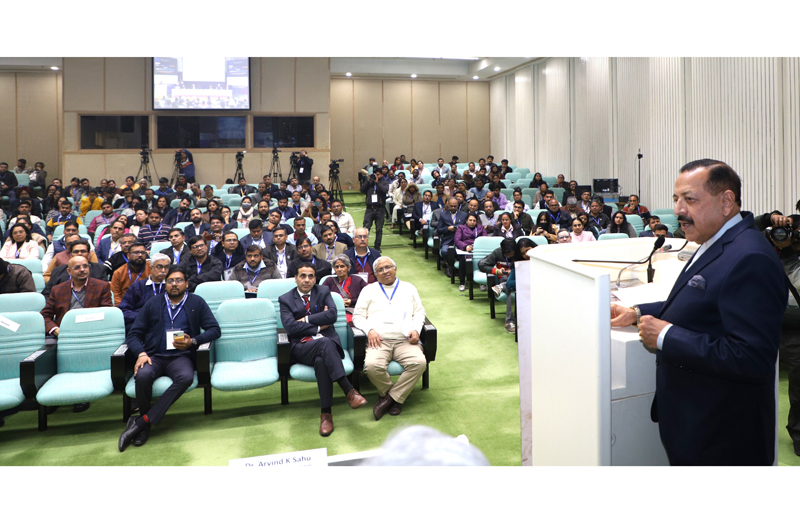Excelsior Correspondent
NEW DELHI, Jan 9: Today, Science and Technology Minister Dr. Jitendra Singh unveiled the Genome India dataset, which includes 10,000 genome samples now accessible to researchers worldwide through the Indian Biological Data Centre (IBDC).
During the Genome India Data Conclave at Vigyan Bhawan, the Minister also introduced the ‘Framework for Exchange of Data Protocols (FeED)’ and the IBDC Portals for Data Access.
Prime Minister Narendra Modi’s video message on this occasion inspired the scientific community and outlined future pathways.
The Department of Biotechnology (DBT) has spearheaded the ‘Genome India’ initiative, focused on whole genome sequencing (WGS) of 10,000 individuals from diverse Indian populations. This project is designed to establish a comprehensive catalog of genetic variations, serving as a significant scientific resource for the nation. By providing access to the Genome India Data, researchers can advance genomic studies and facilitate the creation of genome chips for extensive genetic research, enabling affordability and greater precision in identifying genetic variants.
While addressing the conclave, Dr. Jitendra Singh remarked, “The new Bioeconomy policy launched by the Modi government will establish India as a global leader in the coming years.” He stated that “India’s bioeconomy has surged from $10 billion in 2014 to over $130 billion in 2024, and is projected to reach $300 billion by 2030. This growth reflects India’s robust economic trajectory. The BIOe3 policy will ignite further growth and position India as a frontrunner in the fourth industrial revolution.”
He emphasized that the 10,000 genome samples preserved at IBDC are now available to researchers globally, highlighting the significance of Indian genomic data for healthcare advancements. Dr. Jitendra Singh underscored that these resources will be crucial in the mass production of products such as mRNA-based vaccines and proteins.
Furthermore, he pointed out that “India is now ranked 12th globally in biomanufacturing and 3rd in the Asia-Pacific region. We are the largest vaccine producer and the 3rd largest startup ecosystem.” He added that the biotech sector is rapidly growing, evidenced by the establishment of 95 bio incubators and a surge in biotech startups from about 50 in 2014 to nearly 9,000 today. The rise of these startups is essential for the future economy, and Genome India Data will be instrumental. He also recommended collaborating with TATA Memorial Hospital to enhance cancer-related data.
Prominent figures such as Prof. Ajay Kumar Sood, Principal Scientific Adviser to the Government of India; Dr. Rajiv Bahl, Director General of ICMR & Secretary of DHR; and Dr. Rajesh S. Gokhale, Secretary of DBT, were in attendance, along with senior officials, scientists, and professionals from relevant ministries and institutions.
Dr. Suchita Ninawe, a senior official at DBT, pivotal in establishing the Indian Biological Data Centre and leading the Genome India project, emphasized the importance of the data generated for genomic research in India.


Leave a Reply